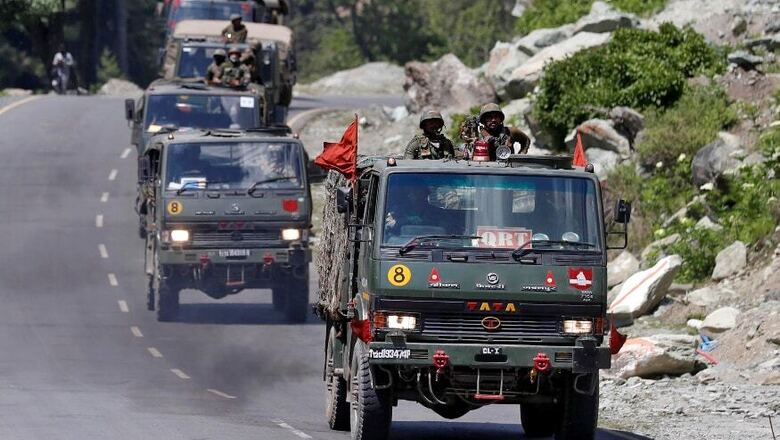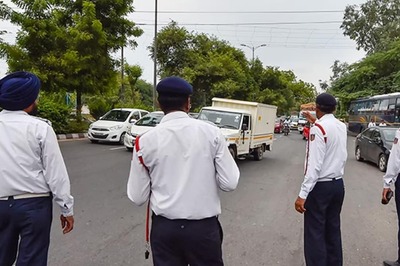
views
A bipartisan US Senate resolution has condemned China's use of military force to change the status quo at the Line of Actual Control (LAC) with India and called for a diplomatic solution to the issue.
Indian and Chinese troops have been locked in a bitter standoff in several areas along the Line of Actual Control in eastern Ladakh since May 5. The situation deteriorated after the June 15 Galwan Valley clashes in which 20 Indian Army personnel were killed. The Chinese side also suffered casualties but it is yet to give out the details.
The resolution, introduced by senators John Cornyn and Mark Warner, commended India for taking steps to secure its telecommunications infrastructure from Chinese security threats and also supported bilateral and multilateral partnerships, such as the Quadrilateral Security Dialogue (QSD), to promote a rules-based order in the Indo-Pacific.
The QSD, also known as the Quad, is an informal strategic forum between the US, Japan, Australia and India. The diplomatic and military arrangement is widely viewed as a response to increased Chinese economic and military power in the Indo-Pacific region. Cornyn and Warner are co-chairs of the Senate Indian Caucus.
The resolution tabled on the Senate floor last week has been sent to the Senate Foreign Relations Committee for consideration. Cornyn is the Republican Senate Majority Whip, while Warner is the ranking member of the Senate Select Committee on Intelligence.
Condemning China's use of military aggression to change the status quo at LAC, the resolution, the text of which was released on Monday, said the US officially recognises the McMahon Line, the state of Arunachal Pradesh and encourages a diplomatic solution to remaining contested areas of the border between India and China. The McMahon Line defines a clear boundary line between India and China. The India-China border dispute covers the 3,488-km-long LAC. China claims Arunachal Pradesh as part of southern Tibet while India contests it.
The resolution said in the months leading up to June 15, China increased troop deployments, built new infrastructure in contested areas, and harassed Indian patrols along multiple sectors of the LAC, particularly around the Depsang Plains, Galwan Valley, Hot Springs, and Pangong Lake. The events of June 15 that resulted in the death of 20 Indian soldiers raises serious concerns regarding the intent of the Chinese government and its military, the resolution said, noting that the incident occurred during bilateral diplomatic negotiations between the officials of the two countries who were attempting to deescalate border tensions.
The resolution also noted that China's action of expanding territorial claims in Bhutan's eastern sector is a "transparent attempt at expanding its illegitimate claims" over Arunachal Pradesh. The US views China's aggression at LAC, in the Indian Ocean and in the Western Pacific as a "threat to the stability and security of the international community", it said.
The resolution committed to deepen US' defence, intelligence and economic ties with India in line with the Comprehensive Global Strategic Partnership. The US and India have signed three foundational military agreements — the General Security of Military Information Agreement; the Logistics Exchange Memorandum of Understanding; and the Communications, Compatibility, and Security Agreement — and are working to sign the Basic Exchange and Cooperation Agreement, it said.
Another bill — 'Strengthening Trade, Regional Alliances, Technology, and Economic and Geopolitical Initiatives concerning China Act' or the 'STRATEGIC Act' tabled in the Senate by Senator James Risch. The resolution said China has capitalised on the world's focus on the COVID-19 pandemic by moving rapidly to undermine Hong Kong's autonomy; aggressively imposing its will in the East and South China Seas; and contributing to increased tensions with India.
The Bill sought to enhance security partnerships with India, across Southeast Asia, and with other nations of the Indo-Pacific. The Senate resolution followed the passage of a similar resolution last month by the House of Representatives as part of the National Defence Authorisation Act (NDAA).
Over the past several weeks, there has been outpouring of support from top American lawmakers, across the aisle, against Chinese efforts to grab Indian territories. Support for India against China has come in the form of tweets, public speeches, House and Senate floor, letters to Prime Minister Narendra Modi and India's Ambassador to the US, Taranjit Singh Sandhu, and Congressional resolutions.
Several lawmakers have also made a call to Sandhu to express their outrage against China.



















Comments
0 comment